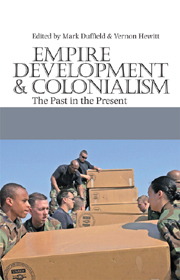Book contents
- Frontmatter
- Contents
- Acknowledgements
- Notes on Contributors
- Introduction
- 1 The Exceptional inclusion of ‘Savages’ & ‘Barbarians’
- 2 Empire, International Development & the Concept of Good Government
- 3 Empire: a Question of Hearts?
- 4 ‘Conflict-Sensitive’ Aid & Making liberal Peace
- 5 Development, Poverty & Famines
- 6 Plain Tales from the Reconstruction Site
- 7 The International Politics of Social Transformation
- 8 Liberal Interventionism & the Fragile State
- 9 Freedom, Fear & NGOs
- 10 Theorising Continuities between Empire & Development
- 11 Spatial Practices & Imaginaries
- 12 Decolonising the Borders in Sudan
- 13 ‘Individualism is, Indeed, Running Riot’
- Index
2 - Empire, International Development & the Concept of Good Government
Published online by Cambridge University Press: 05 February 2013
- Frontmatter
- Contents
- Acknowledgements
- Notes on Contributors
- Introduction
- 1 The Exceptional inclusion of ‘Savages’ & ‘Barbarians’
- 2 Empire, International Development & the Concept of Good Government
- 3 Empire: a Question of Hearts?
- 4 ‘Conflict-Sensitive’ Aid & Making liberal Peace
- 5 Development, Poverty & Famines
- 6 Plain Tales from the Reconstruction Site
- 7 The International Politics of Social Transformation
- 8 Liberal Interventionism & the Fragile State
- 9 Freedom, Fear & NGOs
- 10 Theorising Continuities between Empire & Development
- 11 Spatial Practices & Imaginaries
- 12 Decolonising the Borders in Sudan
- 13 ‘Individualism is, Indeed, Running Riot’
- Index
Summary
Introduction
This chapter sets out to look at the term ‘good government’ and to examine its contemporary meaning in comparison with its usage during the British Empire (Robinson, 1994; Leftwich, 1996). It seeks to draw parallels in the use and evolution of the term, not as a matter of historical curiosity, but in order to increase awareness of the origins of this form of governmentality (or, as Duffield calls it, a liberal strategisation of power) and to highlight parallels with its contemporary use.
From the mid-1930s onwards, good government was improvised and redefined as a strategy of imperial control, following earlier attempts to ‘control at a distance’ through free markets, and then in the wake of various experiments with indirect rule using (or actually inventing) native administration. It then transformed itself by a familiar transformation: from a simple belief in financial solvency and ‘minimum’ governance, through conceptions of trusteeship and self-governance, to an extraordinary commitment to social engineering and constitutional change. So redefined, good government sought to combine British economic interests, with both emergent humanitarian concerns and strategic competition for territory with other Powers. By the mid-1940s, the tenacity and elasticity of the term disguised differences of opinion and usage within the British Empire and within the international community. It was used both by Fabian socialists calling for a new charter of colonial welfare, and by leading conservatives of the day (notably by Malcolm Hailey 1939) as a propaganda tool to placate opponents of empire abroad by explicitly linking empire to social and economic progress.
- Type
- Chapter
- Information
- Empire, Development and ColonialismThe Past in the Present, pp. 30 - 44Publisher: Boydell & BrewerPrint publication year: 2009



